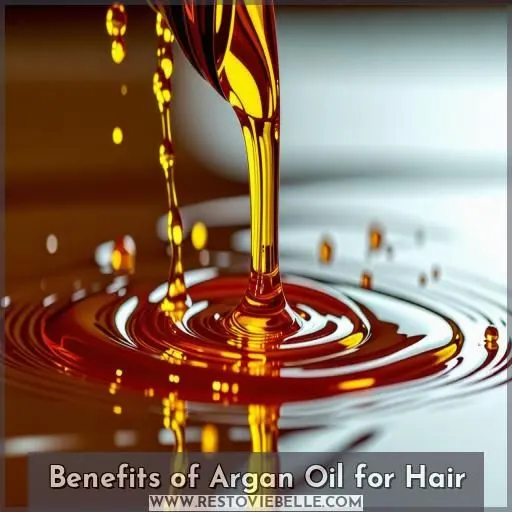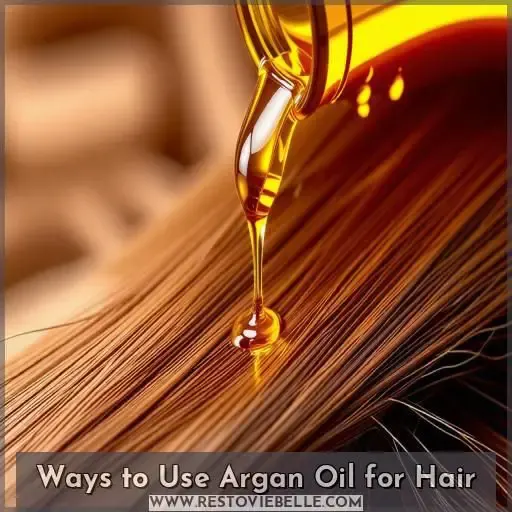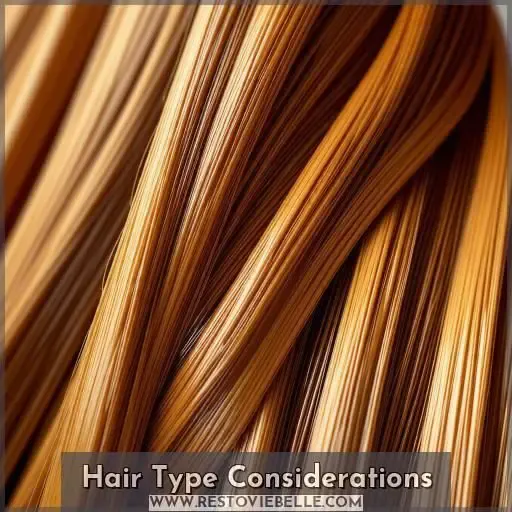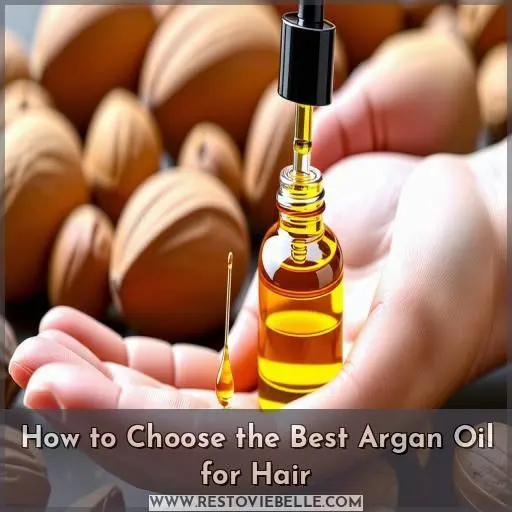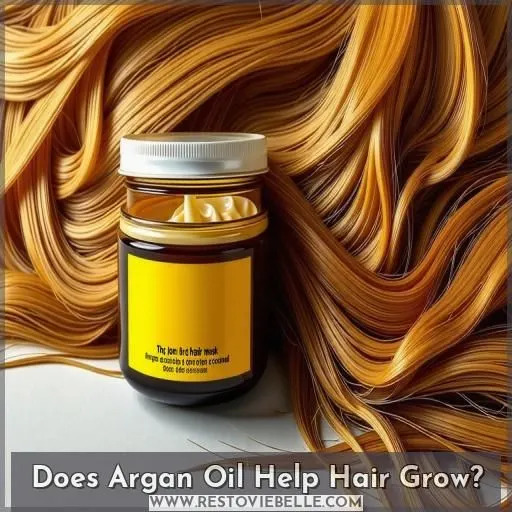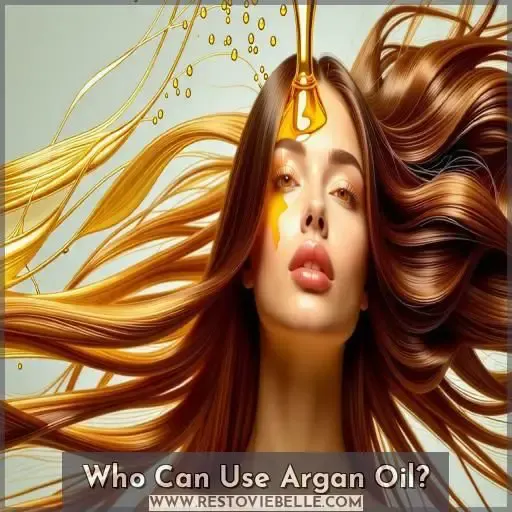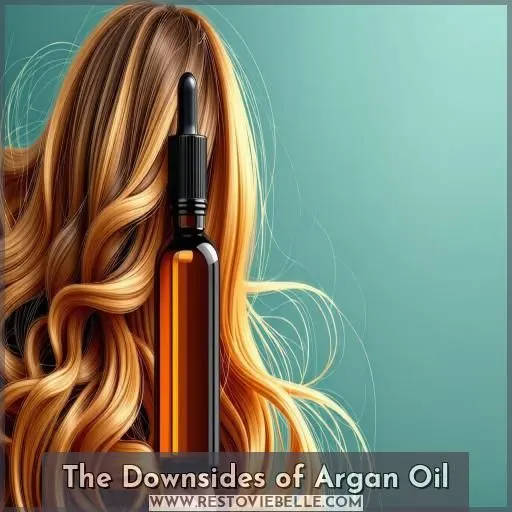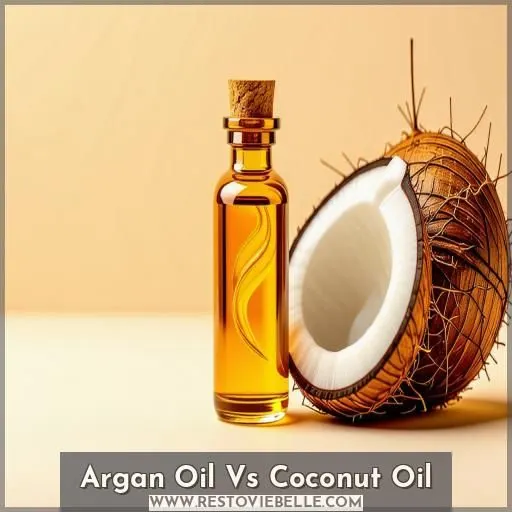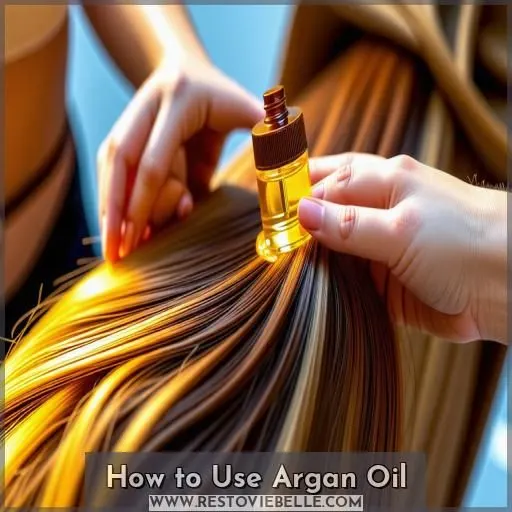This site is supported by our readers. We may earn a commission, at no cost to you, if you purchase through links.
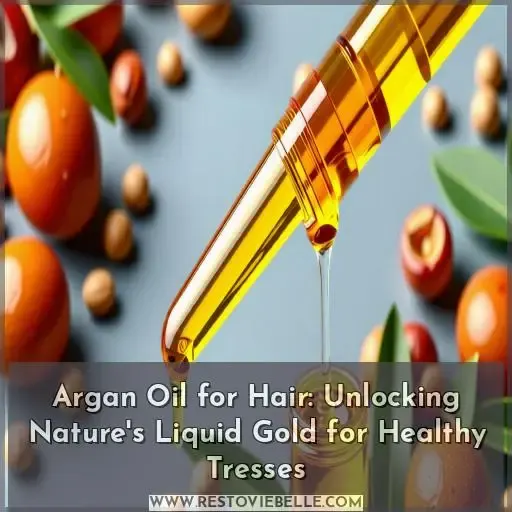 Tired of dull, lifeless locks? Unleash nature’s liquid gold with argan oil for hair!
Tired of dull, lifeless locks? Unleash nature’s liquid gold with argan oil for hair!
This versatile elixir deeply moisturizes and conditions, leaving your tresses silky smooth. But that’s not all – argan oil improves scalp health, prevents damage from styling and coloring, and even offers sun protection.
Don’t let hair loss get you down; argan oil may stimulate follicles for thicker, fuller growth.
From hair masks to leave-in conditioners, there are countless ways to incorporate this liquid treasure into your routine.
Ready to experience the magic of argan oil for yourself? Keep reading to uncover its full potential.
Table Of Contents
- Key Takeaways
- Benefits of Argan Oil for Hair
- Ways to Use Argan Oil for Hair
- Hair Type Considerations
- How to Choose the Best Argan Oil for Hair
- Does Argan Oil Help Hair Grow?
- Who Can Use Argan Oil?
- The Downsides of Argan Oil
- Argan Oil Vs Coconut Oil
- How to Use Argan Oil
- Frequently Asked Questions (FAQs)
- Is argan oil good for your hair?
- Is it better to put argan oil on wet or dry hair?
- Is argan oil good for thin hair?
- Which is better coconut or argan oil?
- Is argan oil good for color-treated hair?
- Can argan oil help with dandruff and itchy scalp?
- How often should I use argan oil for best results?
- Is argan oil safe for pregnant women to use?
- Can argan oil be used on childrens hair?
- Conclusion
Key Takeaways
- Argan oil deeply moisturizes and conditions hair, leaving it silky smooth and radiantly shiny.
- It improves scalp health by preventing psoriasis, seborrheic dermatitis, and dandruff while stimulating hair growth.
- Argan oil can be used in various ways, such as hair masks, shampoos, leave-in conditioners, and styling products, depending on hair type and texture.
- When selecting argan oil, look for 100% pure organic options packaged in dark glass bottles to ensure quality and effectiveness.
Benefits of Argan Oil for Hair
Argan oil is a true gift from nature, offering a wealth of benefits for your hair. It moisturizes and conditions strands, improves scalp health, prevents styling and coloring damage, provides sun protection, and may even help with hair loss.
Moisturizes and Conditions
Argan oil’s fatty acids and vitamin E deeply moisturize and condition hair, lubricating the shaft, maintaining moisture, preventing dryness, and boosting shine .
- Argan oil’s rich fatty acids and vitamin E nourish hair, providing intense hydration and preventing dryness .
- Its lightweight formula absorbs quickly, conditioning hair without weighing it down or leaving a greasy residue .
- Regular use of argan oil leaves hair silky-smooth, manageable, and radiantly shiny – the ultimate hair treat .
Improves Scalp Health
Argan oil’s anti-inflammatory and antioxidant properties nourish your scalp, preventing psoriasis and seborrheic dermatitis while treating dandruff. Vitamin E and essential fatty acids stimulate hair growth for a healthy scalp.
| Scalp Condition | Argan Oil Benefit |
|---|---|
| Psoriasis | Prevents |
| Seborrheic Dermatitis | Prevents |
| Dandruff | Treats |
| Hair Loss | Stimulates Growth |
Prevents Styling and Coloring Damage
Argan oil’s fatty acids create a protective layer, preventing breakage from heat styling, color treatments, and harsh products. Use it as a leave-in serum for frizz control (Source).
Sun Protection
Argan oil’s antioxidants shield hair from UV rays, preventing dryness and damage. Use pure argan oil in leave-in conditioners or styling products for all hair types. Store in a dark glass bottle for maximum protection.
Argan Oil for Hair Loss
Argan oil is beneficial for hair health, potentially aiding in preventing breakage and promoting growth. Its richness in nutrients contributes to scalp nourishment and overall hair strengthening.
| Benefits | Breakage Prevention | Scalp Nourishment | Products |
|---|---|---|---|
| Hair health | Reduce hair loss | Improve scalp health | Moroccanoil, Creme of Nature, Briogeo, Nature Lab Tokyo, Josie Maran |
Ways to Use Argan Oil for Hair
You can transform your tresses by incorporating argan oil into your hair care routine in several ways. Blend it into your shampoo, use it as a nourishing hair mask, apply it as a leave-in conditioner, or leverage its benefits as a styling product.
Argan Oil Hair Mask
Argan oil hair mask deeply conditions, repairs damage, and boosts shine. Massage into hair and scalp, leave on overnight, then wash in the morning for softer, healthier hair (Source).
- Deeply conditions and repairs damage
- Boosts shine and softness
- Massage into hair and scalp
- Leave on overnight, then wash
Shampoo
When using argan oil with shampoo, add the oil to your sulfate-free shampoo every two or three days for optimum results. Consider using a clarifying shampoo periodically to remove product buildup and deeply cleanse your hair.
| Shampoo Type | How to Use Argan Oil | Frequency |
|---|---|---|
| Sulfate-free | Add to shampoo, use every 2-3 days | Every 2-3 days |
| Clarifying | Use as needed to remove product buildup and deeply cleanse | As needed |
| Gentle Cleanser | Mix with shampoo, use regularly | Regularly |
Leave-in Conditioner
Apply argan oil leave-in to towel-dried hair, avoiding the scalp. Use a dime-sized amount for fine hair, more for thick. Repeat 1-2 times weekly for soft, manageable locks. Try Moroccanoil or Briogeo leave-in conditioners.
- Distribute evenly from mid-length to ends
- Provides lightweight hydration and frizz control
- Ideal for all hair types, especially damaged
Styling Product
For styling benefits, apply argan oil to dry hair to protect from styling damage, provide heat protection, control frizz, enhance shine, and achieve hair smoothing benefits. Smooth over hair to distribute evenly.
Hair Type Considerations
When using argan oil for hair, keep your hair type in mind. Those with thick or coarse hair can apply more oil, while those with fine or thin hair should use less to avoid a greasy look.
Hair Type Considerations
Argan oil’s versatility allows it to nourish all hair types. Thicker hair may benefit from daily use, while finer strands shine with weekly applications. Avoid heavy buildup on oily scalps.
Thick Hair Requires More
Avoid discussing things which would be discussed in the NEXT SUBTOPIC entitled ‘How to Choose the Best Argan Oil for Hair’.
Fine Hair Needs Less
If you have fine hair, use argan oil sparingly. A little goes a long way to avoid greasy roots. Adjust the amount based on your hair texture for best results .
Oily Scalp Avoids Roots
If you have an oily scalp, focus argan oil applications on your hair ends to avoid weighing down roots. Adjust amount based on your unique hair type and texture.
How to Choose the Best Argan Oil for Hair
When selecting argan oil for hair, look for 100% pure organic options packaged in dark glass bottles to avoid adulterated or degraded products. Steer clear of argan oils with added fragrances, as the pure oil should be scentless.
Look for 100% Pure Organic
When selecting Argan oil, prioritize 100% pure organic options to guarantee quality and effectiveness. To make an informed choice, focus on the following factors:
- Check for allergy-friendly options
- Consider appropriate storage conditions
- Look for reputable brands
- Verify availability from trusted sources
- Understand the product’s shelf life.
Avoid Scented or Adulterated
Avoid scented or adulterated argan oil to prevent allergic reactions and achieve maximum benefits. Seek pure, sustainable sources for cost-effectiveness and ideal results. Recommended products: Pura D’or Organic Argan Oil, Poppy Austin 100% Pure Argan Oil.
| Characteristic | Pure Argan Oil | Adulterated Oil |
|---|---|---|
| Ingredients | 100% Argan | Diluted |
| Shelf Life | 1-2 years | 6 months |
| Scent | Nutty | Artificial |
| Benefits | Complete | Reduced |
| Price | Higher | Lower |
Packaging Matters: Dark Glass
Packaging is significant for quality argan oil. Select opaque glass bottles to shield the oil from light exposure, which can degrade its efficacy over time. Proper storage in a cool, dark place also extends its shelf life. Incorporate this hair care essential into your routine for glossy hair.
- Opaque glass bottles protect oil from light damage
- Preserve potency and extend shelf life
- Store in cool, dark place for optimal freshness
- Guarantee quality and effectiveness of argan oil
- Invest in proper packaging for best hair results
Does Argan Oil Help Hair Grow?
You’re right to wonder if argan oil promotes hair growth. While it doesn’t directly stimulate growth, its antioxidant phenols nourish and strengthen follicles, and its moisturizing properties prevent breakage and frizz for fuller-looking locks.
Prevents Split Ends and Frizz While Adding Shine
Argan oil’s antioxidant properties shield hair from UV damage, locking in moisture for a frizz-free, glossy mane. Its fatty acids repair split ends, restoring hair’s elasticity. Massage a few drops into dry strands for an instant smoothing effect. Argan oil is a versatile dry hair remedy, taming flyaways and adding shine.
Contains Phenols That Stimulate Scalp and Strengthen Hair Follicles
Argan oil contains phenols stimulating the scalp and strengthening hair follicles, supporting hair growth and health. The antioxidants and vitamin E in argan oil nourish the scalp, promoting ideal conditions for hair growth and preventing damage. This stimulation leads to stronger, healthier hair follicles, ultimately contributing to improved hair growth. Argan oil’s properties make it an effective natural solution for enhancing hair follicle health and stimulating growth.
- Phenols stimulate the scalp
- Vitamin E nourishes the scalp
- Antioxidants support healthy hair growth
Who Can Use Argan Oil?
Argan oil is suitable for all hair types, from coarse and curly to fine and straight. However, the amount used should be adjusted based on your hair’s texture – those with thick, dry hair can use more liberally, while those with fine or oily hair should be more sparing in their application.
Suitable for All Hair Types
Argan oil is a versatile hair treatment suitable for all hair types. Those with thick, coarse, or curly hair can use it daily to tame frizz and add shine. Fine, thin hair types should use it sparingly, focusing on the ends to avoid greasiness. Adjust the amount based on your hair’s porosity and thickness for good results (Source).
Amount Used Should Be Adjusted Based on Hair Texture
Adjust the amount of argan oil based on your hair texture. Fine hair needs less, while thick hair requires more. Apply sparingly at first, adding more if needed. Argan oil absorbs quickly, so you can layer it up. Focus on the ends and avoid the scalp to prevent greasiness. Experiment to find the perfect amount for your hair type.
The Downsides of Argan Oil
While argan oil can work wonders for your hair, it’s important to be mindful of potential downsides. Those with tree nut allergies may experience irritation, and overusing argan oil could lead to an undesirably greasy appearance.
May Cause Irritation in Individuals With Tree Nut Allergies
While argan oil is generally safe, those with tree nut allergies may experience irritation upon topical application. Always do a patch test first. If you have concerns, consult your dermatologist. For sensitive skin, consider an argan oil substitute or dilute with a carrier oil. With proper precautions, you can safely enjoy argan oil’s hair benefits.
Overuse Can Make Hair Look Greasy
While argan oil is a versatile hair treatment, overuse can make hair look greasy. Adjust the amount based on your hair type and texture. Those with fine or oily hair should use it sparingly, focusing on the ends and avoiding the scalp. Individuals with tree nut allergies may experience irritation. Moderation is key for healthy, shiny hair.
- Fine or oily hair: use sparingly
- Thick or coarse hair: use more
- Avoid scalp if oily
- Adjust amount based on texture
Argan Oil Vs Coconut Oil
Regarding hair oils, argan and coconut are two of the most popular options. While both offer advantages, they differ in their appropriateness for various hair types. Argan oil is lightweight and absorbs easily, making it suitable for all hair types, including fine and oily hair. Coconut oil, on the other hand, is thicker and may weigh down fine hair or cause buildup on the scalp. However, coconut oil is better for dry or damaged hair due to its deep conditioning properties. Ultimately, the choice between argan and coconut oil depends on your hair type and specific needs. Experiment with both to see which one works best for you.
| Hair Type | Argan Oil | Coconut Oil |
|---|---|---|
| Fine | Suitable | May weigh down |
| Thick | Suitable | Suitable |
| Dry | Suitable | Suitable |
| Damaged | Suitable | Suitable |
How to Use Argan Oil
To effectively use Argan Oil for hair, here are three essential tips to maximize its benefits:
- Application Methods: Incorporate Argan Oil into your routine by using it as a nourishing conditioner, protective spray, or hydrating hair mask for the best results.
- Product Selection: Make sure you choose a high-quality, 100% pure organic Argan Oil without added ingredients, preferably in a dark-colored glass bottle for preservation.
- Precautions: Use sparingly to avoid greasiness, focusing on the ends rather than the scalp, and adjust the amount based on your hair texture to prevent overuse and achieve the best results.
Frequently Asked Questions (FAQs)
Is argan oil good for your hair?
Like a silky veil for your tresses, argan oil hydrates and fortifies, restoring shine while defending against heat and breakage. You’ll soon notice enviable bounce and luster – a true hair renaissance!
Is it better to put argan oil on wet or dry hair?
It’s best to apply argan oil to damp, towel-dried hair. The oil can penetrate the hair shaft more effectively when it’s slightly wet, sealing in moisture and protecting against damage.
Is argan oil good for thin hair?
Argan oil is a godsend for thin hair. Its lightweight formula won’t weigh locks down while providing essential nourishment to strands.
Which is better coconut or argan oil?
You really can’t go wrong with either, but argan oil is more versatile. It absorbs easily without greasiness, making it ideal for all hair types. Coconut oil is best for very dry or damaged tresses that need serious hydration.
Is argan oil good for color-treated hair?
Imagine your hair, a canvas of vibrant hues, crying out for divine nourishment. Fear not, for argan oil caresses color-treated locks with its restorative embrace, reviving their radiant glory without compromise.
Can argan oil help with dandruff and itchy scalp?
Yes, argan oil’s anti-inflammatory properties make it an effective remedy for dandruff and scalp irritation. The vitamin E and antioxidants soothe inflamed skin, providing relief from itchiness.
How often should I use argan oil for best results?
The very elixir of hair bliss, argan oil truly shines when used every 2-3 days for most. Yet, tailor your regimen to specific needs – damaged strands crave daily doses, while fine tresses thrive on a lighter touch.
Is argan oil safe for pregnant women to use?
Yes, argan oil is generally considered safe for pregnant women. Its nourishing properties can help combat dry, brittle hair during pregnancy.
Can argan oil be used on childrens hair?
Yes, you can absolutely use argan oil on children’s hair. It nourishes and protects young locks without harsh chemicals or buildup. Just use a small amount and focus on the ends first to keep things easy-breezy.
Conclusion
Countless users have reported improved hair health after incorporating argan oil into their routines. With its nourishing properties and multipurpose uses, this liquid gold offers a natural solution for dry, damaged tresses. You can enjoy softer, stronger, and more radiant hair by using argan oil for hair consistently. Access nature’s treasure and experience the transformative power of this versatile elixir.
